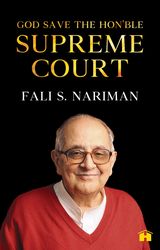“IT WAS THE BEST of times, it was the worst of times, it was the age of wisdom, it was the age of foolishness... it was the spring of hope, it was the winter of despair....”—Fali S. Nariman quotes the opening lines of Charles Dickens’s A Tale of Two Cities to describe the recent events in the Supreme Court. The veteran jurist betrays a tremendous sense of disappointment and pessimism over the controversies that engulfed the top judiciary, since the unprecedented press conference by the four most senior judges.
The title of the book, God Save the Hon’ble Supreme Court, is a clear indication of how Nariman feels about the present circumstance in the top court. And, the 89-year-old jurist believes that the October 10, 2011, event of Justice Dipak Misra taking oath before Justice J. Chelameswar, which resulted in Misra automatically becoming more senior and going on to become Chief Justice of India (CJI), may have had a role in instigating the recent turn of developments.
“To adopt, and adapt, Prof Granville Austin’s felicitous phrase, ‘The belief persists widely’ that Justice Chelameswar did not take kindly to his being sworn in as judge after Justice Dipak Misra,” writes Nariman. “And, it is now apparent how bitterly it soured relations between them, and divided what up to then was (to the public at least) a seemingly undivided court!”
Nariman has been openly critical of the decision of the four judges to go public with their grievances about the manner in which CJI Dipak Misra was administrating the court, and more specifically, the way he was allocating politically sensitive cases to certain benches.
Nariman is especially critical of Chelameswar, saying the judge had made a grave error of judgment by ordering the setting up of a bench of five judges in the Prasad Educational Trust case, in which it was alleged by the petitioners that Misra’s name was mentioned. He also writes that he was greatly perturbed by Chelameswar’s decision, in August 2016, to go public over the lack of transparency in the working of the collegium system. “If a judge in the collegium does not like the way the body functions... he/she can quit and then complain why he/she quit. People would then understand him/her better and appreciate his/her stand,” he notes.
The veteran jurist is also critical of Misra, saying he ought to have replied to the letter addressed to him by the four seniormost judges listing their complaints. “When you reply to a letter you reveal your stand—posterity judges you by what you said at the time, and not by hindsight!”
God Save the Hon’ble Supreme Court
Author: Fali S. Nariman
Publisher: Hay House
Pages: 304
Price: Rs 599


